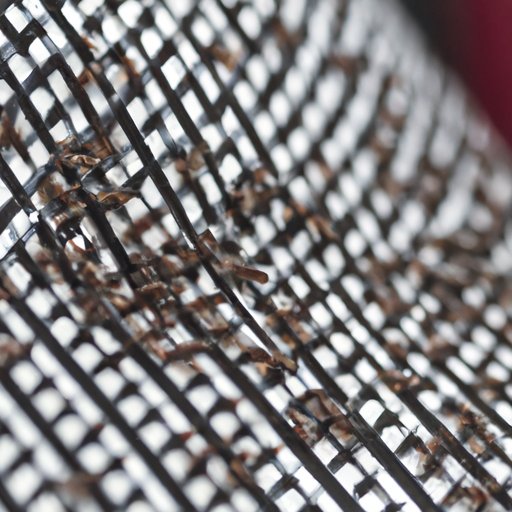
I. Introduction
Flying ants are a common summertime pest that can be annoying, uncomfortable, and even destructive. They are attracted to food, moisture, and warm temperatures, and they tend to swarm in large numbers, which can be intimidating and unsettling for homeowners.
This article is a comprehensive guide that will offer tips on how to keep flying ants away from your home and yard. We will discuss preventative measures, natural repellents, traps, and insecticides that are all effective in keeping these flying ants at bay.
II. Keep Your Yard Tidy
The first step in keeping flying ants out of your home is to keep your yard tidy. Flying ants are attracted to moisture and decaying organic matter, which means that unkempt yards can become an open invitation to these pests.
Trimming back vegetation and removing yard debris such as dead leaves, branches, and twigs can help prevent ants from building their nests. Keeping gutters clean and checking for leaks and moisture can also prevent ants from entering your home.
Covering firewood piles and sealing garbage cans is also necessary to maintain a tidy yard. Flying ants are attracted to decaying wood and organic matter, so it’s important to keep them off your property to avoid an infestation.
III. Seal Up Your Home
Flying ants can enter your home through tiny cracks and gaps that you may not even notice. Sealing up your home is another essential step in keeping these pests out. Use caulk or foam to seal cracks and gaps around doors, windows, and pipes. Install weatherstripping to seal gaps under doors and around windows. Screen vents and windows to prevent entry.
IV. Use Natural Repellents
Natural repellents can be a useful and safe way to deter flying ants from entering your home.
Use peppermint oil, vinegar, or citrus juice to repel ants. These scents can be unpleasant for ants, and they may choose to avoid areas where they are heavily present. Mixing baking soda and powdered sugar to create a natural bait can also be effective for catching and repelling ant colonies.
You can create a sticky trap using paper and honey. Place the trap in areas where you have noticed ants and wait for them to get stuck.
V. Set Traps and Use Insecticides
If natural repellents are not enough to get rid of flying ants, you can also use traps and insecticides.
Place a bowl of soapy water under a flying ant swarm. This will attract them and cause them to drown. Using sticky traps or adhesive tape can also help catch ants.
Insecticides can also be effective in getting rid of flying ants. Be sure to use insecticides that are labeled for use against flying ants, and always follow the instructions carefully. Spray insecticide on ant trails or colonies to effectively get rid of an infestation.
VI. Preventative Measures
Prevention is key when it comes to keeping flying ants away from your home. Storing food in sealed containers and cleaning up spills promptly can help reduce the likelihood of attracting these pests.
Cleaning countertops and floors thoroughly and regularly, and keeping them dry, can make your home less attractive to ants. Taking out the garbage regularly is also necessary to keep these pests away from your home.
VII. Monitor and Persist
Keep an eye on your yard and home regularly for signs of ants. If you notice ants, be persistent in using repellents, traps, and insecticides. It can take time and effort to get rid of a flying ant infestation, but with diligence and persistence, you can keep these pests away from your home.
VIII. Conclusion
Getting rid of flying ants requires a multi-pronged approach that includes keeping your yard tidy, sealing up your home, using natural repellents, traps, and insecticides, and practicing preventative measures. By being proactive and diligent in keeping these pests away, you can enjoy a pest-free home and yard.
Remember to be persistent and monitor your home and yard regularly for signs of flying ants to stay ahead of potential infestations.




